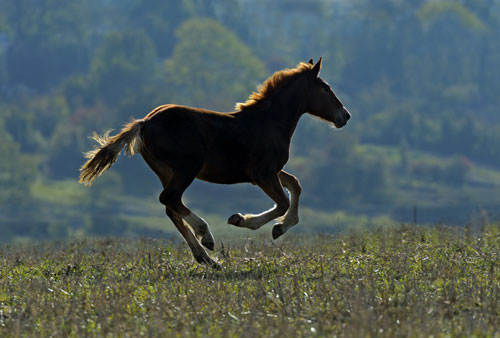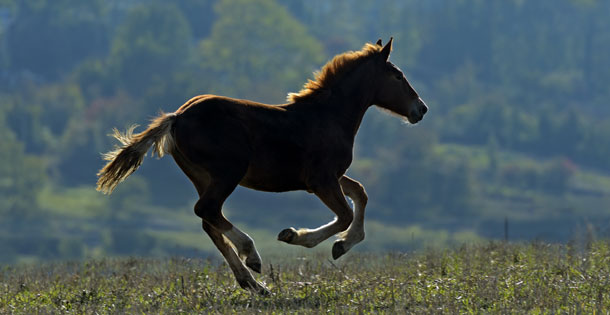
Edward Kindy stood at his window and studied the crest of the ridge a mile away. He paid no attention to the budding trees, or the cloudless sky, or the grazing cattle sprinkled like pepper over the hillside. He was watching for a red Ford pickup. It wouldn’t be hard to spot–the hills and pastures were green, the sky blue, the dirt road a bumpy strip of brown.
And the two people inside the truck…He smiled as he thought about them. They were as different from each other as daylight and dark, those two, and yet alike in so many ways. For one thing, they were both children, though one was more than 70 years old. You had to be a child, Edward decided–at least in your mind–to do what they were hoping to do. Or even to try it. Edward wanted to share that hope; he really did. But he couldn’t. He was too practical, too realistic. And he knew Bud McAfferty far too well.
He sighed. The trip the two friends were making had been futile from the start, a complete waste of time. And the sight of the pickup wouldn’t even mean they were bringing home good news–it would only mean they had returned. Still, he stood there chewing his lip, watching for it.
After a while Edward checked the clock on his desk. He had a dozen other things to attend to. Unpaid bills, unanswered phone messages, a half-finished speech for the Rotary Club. There was even a burglary to be solved: Last night someone had broken into one of the equipment sheds and stolen some of his hunting gear. The first crime he could remember ever happening on the farm. And what was he doing about all these things? He was standing here at the window, like a schoolgirl waiting for her first date.
He ran a hand over his face, circled his desk, sat down for a full five seconds, then rose again and went back to the window.
Where were they?
IN FACT, EDWARD KINDY wasn’t the first man to stand at that window and stare out at the road leading to the top of the ridge. Edward’s father, and his grandfather too, had watched traffic–horses and wagons at first, and eventually automobiles–flow up and down that trail for almost a hundred years. For it wasn’t just the road to places like Bud McAfferty’s. It was the road to the outside world.
Nestled deep in the hills of Fulton County, Mississippi, Kindy’s Farm was as huge as it was prosperous. Technically, it could’ve been called a ranch: a rambling house, dusty yards and corrals, clusters of outbuildings, cattle as far as the eye could see. Edward’s father, Amos, even made a big thing of riding around the place on horseback all the time, checking on his holdings like a modern-day Ben Cartwright. Edward’s wife joked that they should call it the Pinederosa.
But here in the South in the late 1970s, it was merely a farm. The idea that “ranch” might sound a little more glamorous had probably never occurred to Amos Kindy–and even if it had it wouldn’t have prompted much of a reaction. The truth was, not many thoughts crossed Amos’ mind these days, and when one did, it didn’t stay long. Old Amos was a simple man, in both appearance and mentality.
According to those who knew him well, Amos Kindy was more lazy than dumb. He had never had to do much of anything, and as a result he didn’t do much of anything. He was blessed, however, as fools and laggards often are, with a guardian angel. In this case, three of them–his son Edward, his daughter-in-law Rebecca, and his foreman Gus Newberry. They ran the place, and together managed to keep old man Amos out of trouble and out of the poorhouse. Despite their current run of good fortune, neither outcome was ever far away, Edward knew. And he and Rebecca had more to worry about than just themselves and his father. There was now another reason for them to keep the business solvent and their future secure.
Her name was Margaret.
AT THE AGE OF 5, Margaret Elizabeth was the shining star of the Kindy realm. She was both clever and quiet, and had inherited the golden-haired beauty of her mother, a Delta girl Edward had met and married during their years at Ole Miss. An only child, little Margaret was admired by everyone who knew her, with the possible exception of Amos himself, whose only love was climbing onto his aging horse and loping through the pastures with a blank look on his face. Oddly enough, the one person who seemed to care about Margaret the most was the foreman, Gus Newberry.
Gus was a tall African-American man of indeterminate age, though most guesses put him in his early 70s. “I never really wrinkled a lot,” he once explained to Edward, “I just expanded.” And he had certainly done his share of that: Gus weighed in at 220 or so, and was still as strong as a bull. He had a bushy mustache and wire-framed glasses and seven identical pairs of bib overalls that he rotated throughout the week. Except for Sunday mornings, when he dressed up in a stiff white shirt and suspenders and a gray felt hat and drove the 15 miles to church, he always looked the same, right down to the blue baseball cap that sat squarely on a head of short gray hair.
A kind and loving man with a huge family, Gus Newberry was painfully aware of old Amos Kindy’s indifference to little Margaret. It just wasn’t natural, Gus thought. A grandchild was to be cherished, not ignored. She had the love of her parents, of course, but since her grandmother was deceased and her mother worked in town all day and Edward was always occupied with farm business, she was usually left in the care of a maid who had little time and less patience. At 5 years of age, Margaret was showing signs of becoming a sad and lonely child.
And then one day Gus asked Edward to let him take Margaret fishing. The two of them spent most of that afternoon with a pair of cane poles on the bank of the pond behind the main house, and afterward Gus took her along on his rounds. She was thrilled. The next day he let her ride the old mule he sometimes still used for plowing his personal garden, and the following week he taught her to feed the cows and plant okra and set the wooden poles for running-beans.
As the months passed the two grew ever closer. On most afternoons that summer–and almost every weekend–they went fishing or rabbit hunting. Together they built campfires and repaired fences and shucked corn and braided bullwhips, and sometimes spent hours just sitting on a log at the edge of the north pasture, talking about faraway places Gus had seen, like New Orleans and Atlanta. He took to calling her “Little Bit,” not so much because of her size but because of his, and she called him “Augustus”–a name that seemed to delight him, though no one else on the farm would have dared use it.
By the time she was 6, Margaret loved Gus Newberry with all the affection denied her by her grandfather, and the feeling was clearly mutual. The strange thing was, everyone seemed to approve of their relationship. Even here, in the heart of the Deep South, where racial tensions often ran as deep as the bottomless swamps along the river, the simple bond between these two people–one old and black and one very young and white–was accepted by all who knew them. On the rare occasions when someone asked Gus about it, his response was prompt and gruff and honest: There was nothing in this world, he said, that he wouldn’t do for little Margaret.
Become a Saturday Evening Post member and enjoy unlimited access. Subscribe now



